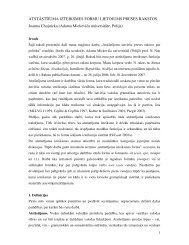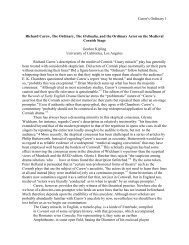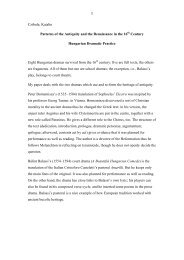Amir Weiner Getting to Know You
Amir Weiner Getting to Know You
Amir Weiner Getting to Know You
You also want an ePaper? Increase the reach of your titles
YUMPU automatically turns print PDFs into web optimized ePapers that Google loves.
GETTING TO KNOW YOU 43<br />
large numbers of local informants. Yet, in the absence of a universalist ethos,<br />
none sought the integration of either informants or the surveilled population<br />
as citizens. Hampered by ignorance of indigenous societies and often unable<br />
<strong>to</strong> penetrate their information systems, the security agencies strictly observed<br />
and institutionalized a colonial hierarchy between rulers and “deceitful<br />
natives” on racial and often-overlapping class lines. This hierarchy, in turn,<br />
limited the formation of a common agenda between regime and population<br />
and between agents and local informants. 121 Similar obstacles hindered<br />
the Nazi continental empire when it engaged with the same populations<br />
discussed in this essay, which it approached with a contrasting package <strong>to</strong> that<br />
of the Soviets: an outdated operational intelligence, on the one hand, and<br />
a formidable arsenal of social-cultural knowledge, on the other. Subjecting<br />
these societies <strong>to</strong> their racial ethos, the Nazis maintained a rigid hierarchy<br />
that a priori excluded locals, collabora<strong>to</strong>rs included, from integration in<strong>to</strong><br />
the empire’s socio-political fabric. 122 Reflecting on both systems, a young<br />
Frenchman who witnessed the Soviet operations in person in Es<strong>to</strong>nia,<br />
offered an apt observation. “[The SS] would not have done as well,” wrote<br />
Jean Cathala. “What fascism lacked was … a structured power in which civil<br />
society, the political regime, the economy and repression completely overlap<br />
and, especially, the anchoring in one state of the mentalities and cus<strong>to</strong>ms<br />
that had been emerging from the beginning of time. National Socialism was<br />
incapable of filling that hiatus except with atrocities.” 123<br />
Modern nation-states that have coped with similar situations seem <strong>to</strong><br />
offer a more apt comparison <strong>to</strong> the Soviet imperial nation-state hybrid.<br />
The tale of the Israeli security services and the Arab minority in Israel<br />
121 C. A. Bayly, Empire and Information: Intelligence Gathering and Social Communication in<br />
India, 1780–1870 (Cambridge: Cambridge University Press, 1996); Martin Thomas, Empires<br />
of Intelligence: Security Services and Colonial Disorder after 1914 (Berkeley: University of<br />
California Press, 2008).<br />
122 On Nazi studies in the 1930s of societies they would later occupy, see Michael Burleigh,<br />
Germany Turns Eastward: A Study of Ostforschung in the Third Reich (Cambridge: Cambridge<br />
University Press, 1988). On Nazi ethnographers’ encounters with the Soviet population, see<br />
Eric J. Schmultz and Samuel D. Sinner, “The Nazi Ethnographic Research of George Leibrandt<br />
and Karl Stumpp in Ukraine, and Its North American Legacy,” in German Scholarship and<br />
Ethnic Cleansing, 1919–1945, ed. Ingo Haar and Michael Fahlbusch (New York: Berghahn,<br />
2005), 51–85. It is important <strong>to</strong> note that when the entire number of Soviet informants is taken<br />
in<strong>to</strong> account—including party, Komsomol, and trade union members, street patrol forces, and<br />
those involved in the constant mobilization campaigns—it more than matches the estimated<br />
5–10% of voluntary informants in Nazi Germany. On the Nazi estimate, see Gieseke, Mielke-<br />
Konzern, 118. For an informed challenge <strong>to</strong> the overemphasis of denunciations as the primary<br />
<strong>to</strong>ol in Nazi Germany, see Johnson, Nazi Terror.<br />
123 Jean Cathala, Sans fleur ni fusil (Paris: Albin Michel, 1981), 97.

















